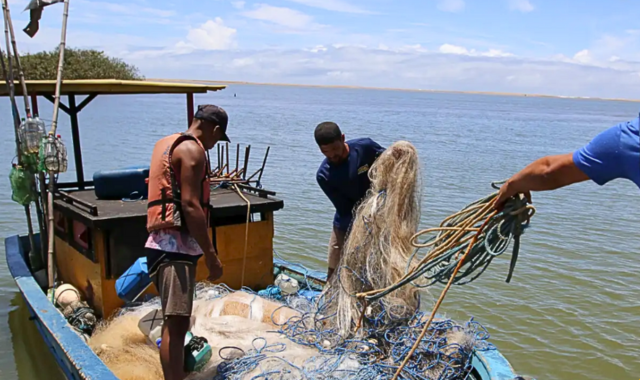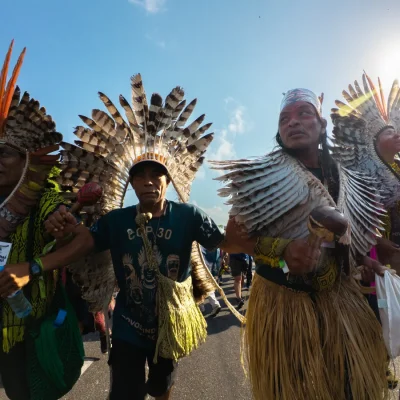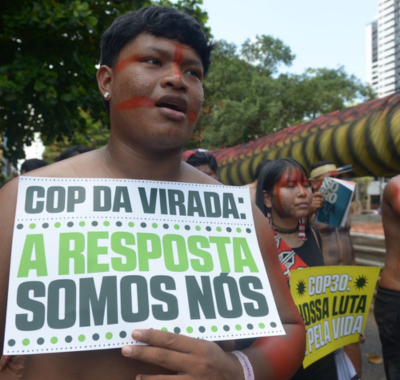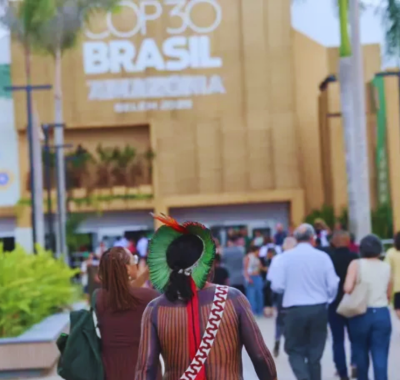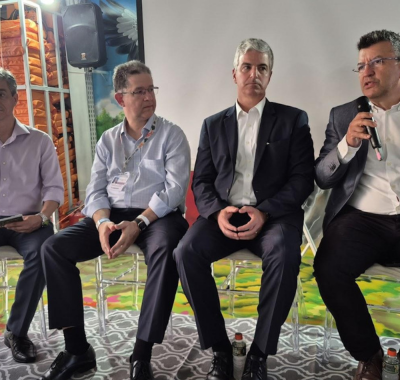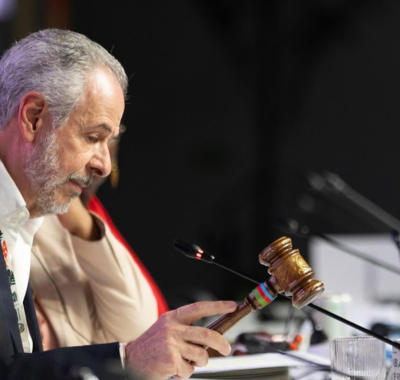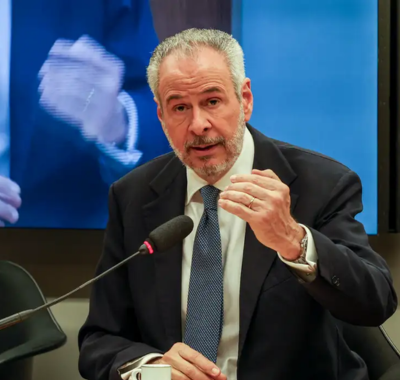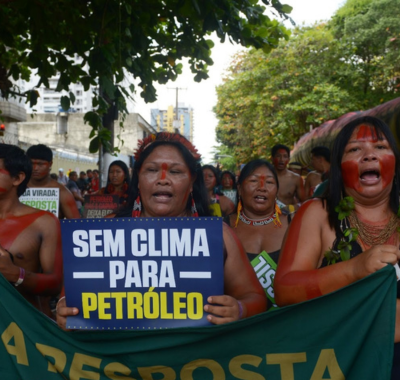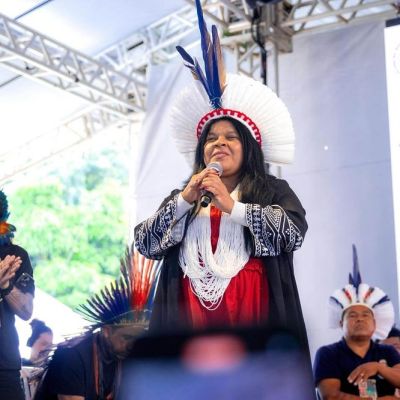Fishing produces animal protein with a low carbon footprint but is heavily impacted by climate change’s effects on the seas.
By Vinicius Konchinski
Translation: Roberto Cataldo/Verso Tradutores
Approximately 1.6 million Brazilian fishers may be directly impacted by negotiations at COP30 in Belém, Brazil. This is the number of people who live off fishing in the country’s coastal regions according to the federal government’s General Fishing Registry (RGP).
Therefore, protection of the marine environment guarantees the livelihoods of those fishers and their families. This year, the UN climate conference decided to place the oceans at the center of global climate debates due to their ability to contain global warming.
According to official data, half of Brazilian fishers are women, and 99.7% practice small-scale fishing, that is, they use small boats and traditional techniques to catch fish, shrimp, and other seafood items.
Fishing – especially when it is practiced at a small scale – emits relatively small amounts of greenhouse gases. According to the Organization for Economic Co-operation and Development (OECD), the entire fish production chain, including aquaculture, that is, fish farming, generates 4% of global carbon emissions.
That is why a commission on health and nutrition created by scientific journal The Lancet (EAT-Lancet) published a report in October stating that fishing is the only source of animal protein for human consumption whose production should be expanded.
“Fishing doesn’t require inputs. Done in a balanced way, the damage it causes to the environment is [only] the pollution from boats’ engines,” says oceanographer Martin Dias, who is the scientific director of Oceana, an environmental organization focused on protecting the marine environment. “Beef protein production, on the other hand, depends on pastures, which are located on land that used to be forests,” he points out.
He emphasizes that, if well regulated, even industrial fishing causes relatively low impacts compared to livestock farming. That is why it can be a source of food, jobs, and income compatible with the needs imposed on humanity by the climate crisis.
A threatened solution
Dias stresses that fishing depends on a healthy ocean. “Some fish species live in cold ocean currents. If global and ocean temperatures increase, we’ll see species migrating to colder areas and loss of fish in certain regions,” he warns. According to him, this is already happening with hake, a popular fish in Brazil.
He also explains that, in extreme cases, warmer waters cause the collapse of the reproductive chains of certain types of fish. According to him, scientific literature has extensively documented that the increase in the temperature of the Pacific Ocean caused by the El Niño phenomenon, when extreme, considerably reduces the presence of sardines on Brazil’s Atlantic coast. “If El Niño events become increasingly frequent and strong, it could be a threat to the species,” he adds.
An article published in Nature in 2020 predicts that climate change could cause a 40% decline in fish stocks in tropical regions over the next 30 years. Studies conducted by Embrapa (the Brazilian Agricultural Research Corporation) and released in October indicate that global warming makes microplastics even more dangerous to aquatic life.
“In the aquatic environment, these particles are not alone and can combine with chemical pollutants, undergo changes due to solar radiation, and interact with temperature variations. These combined factors may have more severe effects on aquatic fauna,” explains Embrapa Environment researcher Vera Castro.
Marly Lucia da Silva Ferreira, 60, a fisher from the Caeté-Taperaçu Marine Extractive Reserve in Bragança, Pará, says that climate change is also making tides stronger, affecting mangroves, where fish reproduce. According to her, the effects are already being felt by fishers in her community. “Fish are increasingly scarce,” she says, adding that she has been attending COP30 discussions in person to demand solutions for fishers.
The COP of the Oceans
COP30 has been giving unprecedented attention to the oceans. For the first time, the meeting has a special envoy to address the seas in its plenary sessions: Brazilian biologist and professor Marinez Scherer.
In an interview with Repórter Brasil last week, she regretted the fact that less than 1% of climate finance is allocated to the oceans, even though they account for 70% of the Earth’s surface and absorb 30% of the carbon dioxide released into the atmosphere.
“Protecting the oceans is protecting life – and making them a COP30 priority is not only an environmental decision, but also an economic, geopolitical, and humanitarian one,” she said. According to her, more than 3 billion people depend on the ocean worldwide. The ocean economy is estimated at almost US$ 4 trillion a year – up to 5% of global GDP.
Scherer also stated that she is working to ensure that COP30 is a launchpad for the so-called Blue Package, an initiative that gathers hundreds of actions and projects already implemented around the world and which, according to her, “are known to bring positive results in ocean preservation,” including incentives to sustainable fishing practices. She wants the Blue Package to receive financial support sources of up to approximately R$ 615 billion from governmental and independent sources.
“Blue Food”
In an article published on November 11, Brazil’s Minister of Fisheries and Aquaculture André de Paula and Portugal’s Secretary of Fisheries Salvador Malheiro wrote that the climate strategy should consider fish as a type of “blue food”. According to the authors, fish “have the potential to meet the growing demand for protein with a significantly smaller environmental footprint.”
“Studies indicate that, with increased consumption of blue foods, global CO₂ emissions could be reduced by up to 1 gigaton per year by 2050 – the equivalent of three million transatlantic round-trip flights,” the article states.
“The term ‘blue food’ encompasses fisheries and aquaculture of fish, mollusks, algae, and other aquatic organisms. In addition to being rich in protein and essential micronutrients, these foods play a crucial role in combating malnutrition, which still affects more than 2 billion people worldwide.”
According to Oceana, in 2022, 90 million tons of fish were caught worldwide. Brazil contributed 351,000 tons, 56.3% of which came from small-scale fishing. Furthermore, the country’s marine and continental fisheries contributed approximately R$ 1.3 billion in exports in 2024.
The main fish items exported by Brazil are lobster, caught exclusively by small-scale fishing in the Northeast region, and snapper from industrial fishing in the North. In the last 10 years, these two production chains alone exported approximately 71,000 tons of products, generating R$ 6.3 billion in revenues.
This Monday (17), during COP30, Oceana will present a document entitled “Pathways to climate change-resilient fisheries in Brazil – Recommendations for decision-makers”. The organization suggests six actions on sustainable fishing: permanent data collection; improvement of fish stock assessments; fostering adaptive management; guaranteed social participation; protection of essential habitats; and promotion of regional cooperation between countries.
Some of these recommendations are included in Bill 4789/2024, which creates a new National Policy for Sustainable Fisheries Development. The bill is currently under review in Congress. According to Oceana, its approval would enable concrete measures for a fishing activity that is more adapted to the global climate context.
This report was produced by Repórter Brasil, through the Collaborative Socio-environmental Coverage of COP 30. Read the original report at: https://reporterbrasil.org.br/2025/11/cop30-oceano-renda-pescadores-brasil/

